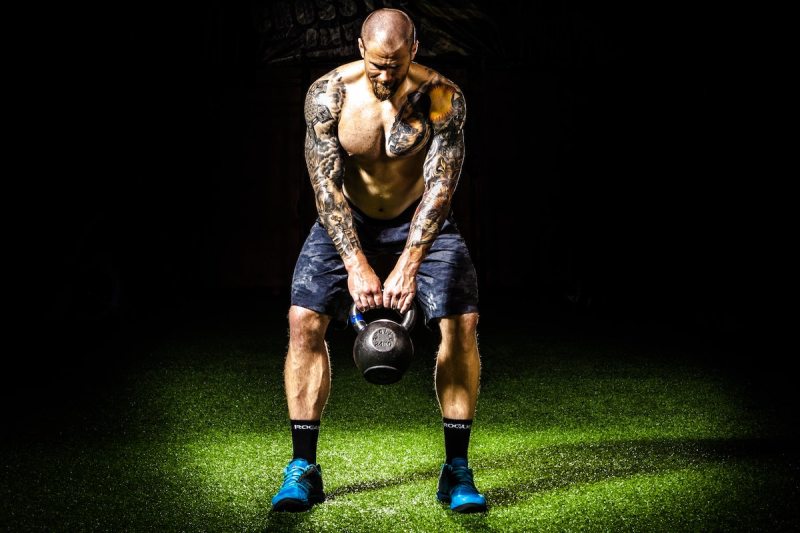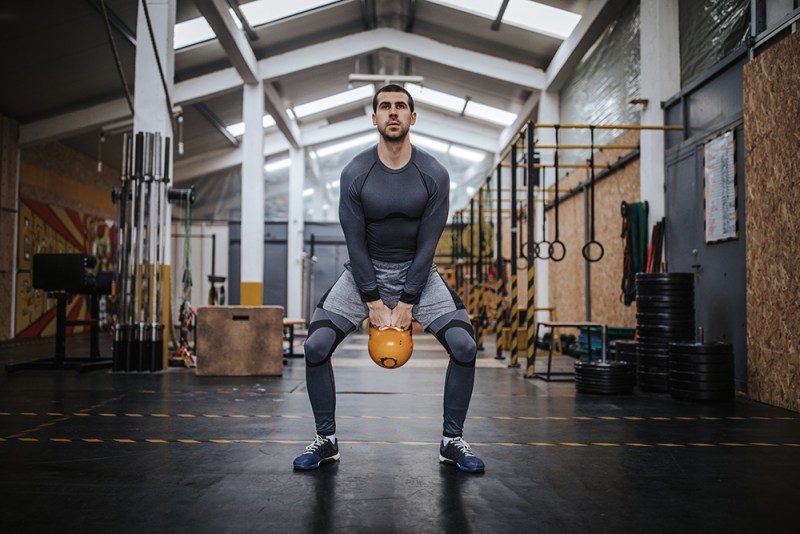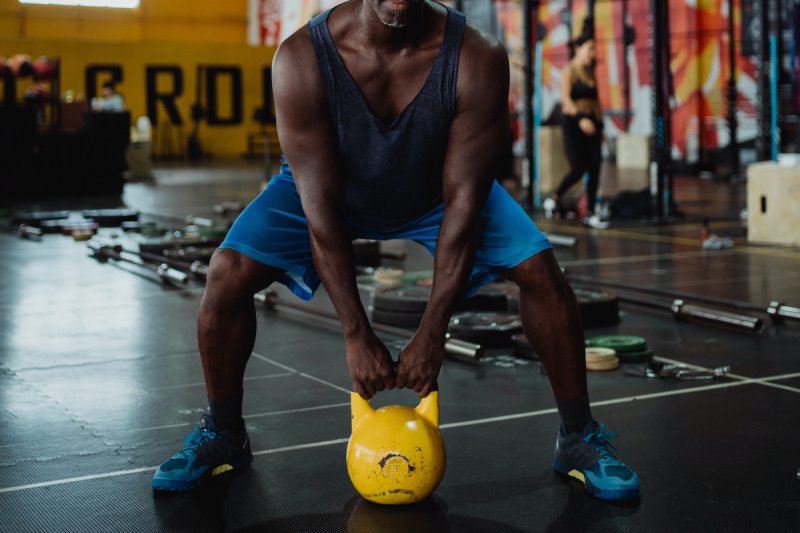Swinging a kettlebell around sparks a primal feeling, whether it’s a Russian kettlebell swing, a lateral swing, a single-arm swing, or another variation of the exercise. Kettlebell swings are renowned for strengthening your deeper core muscles, glutes, hip flexors, quads, and more. They are high-intensity, low-impact exercises that works your whole body. Here’s the lowdown on kettlebell swings.
CONTENTS
- What are kettlebell swings?
- What are the benefits of kettlebell swings?
- What muscles do kettlebell swings work?
- How to perform kettlebell swings
- Common mistakes
What are kettlebell swings?

Kettlebell swings are an increasingly popular movement originating from Russia. In Russia, kettlebells, or “girya” in Russian, were used in strength competitions. This calorie-burning CrossFit movement involves crouching down, grabbing a kettlebell, and swinging it up in a “pendulum” motion with your arms straight out in front of you.
Recommended Videos
496.3K
77
Billy Porter Ways to Give PayPal Promo
What are the benefits of kettlebell swings?

This classic exercise can improve your cardiovascular fitness, and all you need is a kettlebell to get started. Here are some of the many benefits of kettlebell swings:
- Cardiovascular fitness: During this full-body workout, your heart has to beat faster to pump blood through your body.
- Work your whole body: This move engages your upper body, lower body, and core. It’s popular for targeting your posterior chain, which are the muscle groups on the back of your body.
- Burn calories: Kettlebell swings are high-intensity movements and help you burn calories, which could contribute to weight loss over time.
- Low-impact movement: Because your feet are firmly on the ground rather than jumping around, kettlebell swings are considered a low-impact exercise that reduces pressure and force on your knees.
- Boost your strength and power: Kettlebell swings enhance your overall physical fitness because they require high-force activation of certain muscles. They can also improve grip strength.
There’s something about kettlebell exercises. Impressively, a 2010 study assessed the effectiveness of kettlebell exercises and highlighted that compared to standard weight-training routines, kettlebells provided a significantly higher-intensity workout along with quicker and better results. The study also concluded that kettlebell workouts help you lose weight, burn calories, and enhance functional performance.
What muscles do kettlebell swings work?

Kettlebell swings are a full-body workout that engages multiple muscle groups simultaneously, including your:
- Core network, abs, and deeper core muscles
- Glutes
- Hip flexors
- Shoulders
- Arms
- Lower and upper back, such as your trapezius and rhomboids
- Hamstrings
- Quads
- Calves
Your hamstrings, glutes, and lower back muscles take on a large portion of the work. You’ll also notice activation in your pectorals, forearm muscles, and other muscles of your anterior chain, which refers to muscle groups at the front of your body. Even your feet help balance and stabilize you and grip the floor.
How to perform kettlebell swings

Here’s how to perform a kettlebell swing:
- Stand with your feet about shoulders-distance apart while holding a kettlebell with both hands and your arms straight down. Your palms should be facing toward you.
- Bend your knees and engage your core.
- Carefully swing the kettlebell back and down between your legs to start to build momentum.
- Push your hips forward so your body is in more of a standing position and use this momentum to swing the kettlebell up to your chest level or higher.
- Repeat the movement for your desired number of repetitions.
Common mistakes

It’s important you perform a kettlebell swing with the proper form to gain the best possible results and lower your risk of injury. Kettlebell swings can be a safe and effective exercise. Here are the common mistakes to avoid:
- Lifting more with your arms rather than the momentum and power from your lower body swinging the kettlebell. Your arms should be more of a guide rather than a powerlifter.
- Squatting down too low rather than just bending your knees.
- Swinging too fast and losing focus.
- Swinging too low down to the floor.
- Using a weight that’s too heavy.
- Leaning back too much, which can exert pressure on your back.
Variations

There are other variations you can try in addition to the traditional two-handed kettlebell swing. Here are some of the most common variations:
- The single-arm kettlebell swing is a unilateral exercise that also engages your anti-rotation muscles. As the name suggests, it involves using one arm instead of two.
- With the lateral kettlebell swing, you swing the kettlebell laterally from side to side instead of up and down in front of you.
- The staggered-stance kettlebell swing involves placing one foot slightly in front of the other.
FAQs and top tips

Here are some FAQs and top tips to help you master the kettlebell swing:
- Be sure to squeeze your glutes and shoulder blades.
- Engage your core and try to keep your back straight.
- Hinge forward with your hips.
- Most of the force should come from your glutes and legs rather than your arms and shoulders.
- When the kettlebell reaches its highest point, your ankles, knees, hips, and shoulders should all be vertically in alignment and stacked on top of each other.
- Try not to abruptly stop a kettlebell swing. Instead, slowly reduce your power and speed until you reach a safer stopping point.
- Start with a lighter weight and gradually work your way up once you’ve mastered your form. The weight of the kettlebell should provide a challenge without compromising your form.
Is 100 kettlebell swings a day enough exercise?

The right amount of daily kettlebell swings for you depends on a number of factors, such as your general health, goals, experience, and strength. In general, 100 kettlebell swings a day can significantly improve a beginner’s fitness level, but more experienced individuals might need to perform a higher number of daily swings to gain the most benefit and achieve their goals. It’s important to include some rest days to give your body time to recover.
How heavy should a kettlebell swing be?

The right weight for you depends on several factors, including your experience and strength. Beginners should choose lighter weights weighing around 5 to 18 pounds while focusing on proper form. As you perfect your form over time, you might choose to increase your kettlebell weight. Heavier weights range from around 18 to 70 pounds.
What is the kettlebell swing good for?

The kettlebell swing is an excellent choice if you’re looking for a full-body workout that hits multiple muscle groups at the same time. Kettlebell swings can boost your overall physical fitness, cardiovascular fitness, and your ability to perform functional activities.



